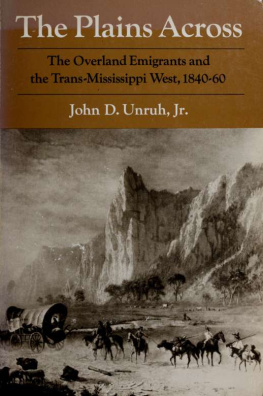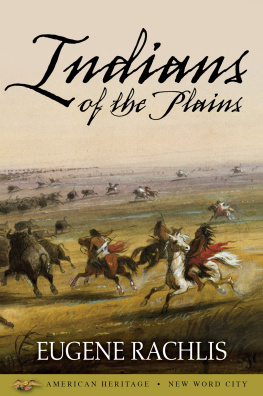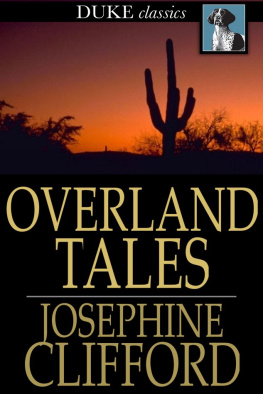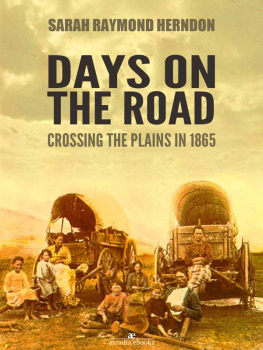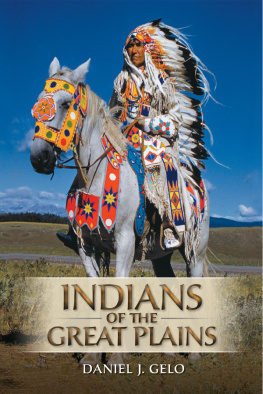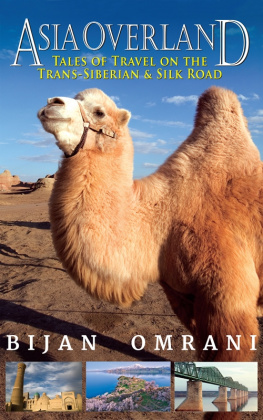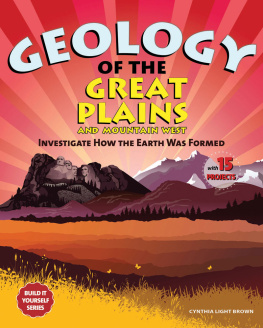This book made available by the Internet Archive.
Publisher's Note
Many reviewers of the original 1979 edition of The Plains Across praised it as a book that achieved a high level of scholarship without sacrificing readability. The eminent western historian Ray Allen Billington, for example, commented that John D. Unruh, Jr., had "not only produced the best book yet written on the overland journey" but had done so in a work that "is so rich in anecdote, so sparklingly written, and so free of academic gobbledygook that it might have come from the pen of a best-selling popularizer."
The purpose of this edition is to make the book more accessible to students and other interested readers than the relatively high-priced earlier edition of almost 600 pages. The extensive notes and the substantial bibliography have been eliminated, as have some of the illustrations that appeared in the first edition. The text, with one exception, is unchanged. Eliminated is the introduction, a historio-graphical survey of the literature on western emigration. This was an essential part of the doctoral dissertation for which it was written, but it is likely that it would have been drastically reduced in size or perhaps transformed into a bibliographical essay if the author had lived to do the kind of revision that is almost always needed before a dissertation is published. Since John Unruh died before such revision could be contemplated, the decision was made to publish the work without substantive changes.
In this edition, however, it is in the publisher's judgment desirable to delete this material, which is primarily of interest to the professional historian and the serious collector of western Americana, two groups which will, we believe, want to have available the original edition. Indeed, it is an assumption of the publisher that students and others who develop a serious interest in the subject of western emigration will have access through the library to the scholarly apparatus in the original volume.
Added in this new edition is a brief bibliographical note by Martin Ridge, Senior Research Associate at the Huntington Library, who served as a member of the committee that selected The Plains A cross as winner of the first Ray Billington Award of the Organization of American Historians.
Vll
Foreword
X
his magisterial study, now an impressive book, was a doctoral dissertation begun under the direction of the late distinguished historian and teacher George L. Anderson at the University of Kansas, and completed after Professor Anderson's death under his colleague Clifford S. Griffin of the same university. The author, John David Unruh, Jr., was admitted to doctoral candidacy at the university in 1967. It was not until October, 1975, that he successfully defended his completed dissertation and was awarded the Ph.D. in history. Eight years of tireless research and writing were invested in completing the dissertation: that it was destined for publication will quickly become evident to the reader.
There is no doubt that it is a superb achievement. The research, both in printed and manuscript sources, is near-exhaustive, as a glance at the extensive bibliography will reveal. Emigrant diaries, journals, and letters, contemporary newspapers, books and articles, theses and dissertations little escaped John Unruh's attention. What has been fashioned from that prodigious researchthe first synthesis on overland travel in the antebellum periodwill surely become a classic.
Although a large body of books and articles have touched on some of the subjects included in the narrativethe role played by the federal government, the Indians, and the Mormons in the overland endeavor, ferrying and other entrepreneurial activities, sickness and disease, equipment and coststhis is the first study to present an overall synthesis on overland emigration for the entire 1840-60 period. The Introduction, which ably surveys and critiques the existing body of pertinent literature, makes this point abundantly clear.
Not only has the author structured a comprehensive synthesis, he has also fashioned a hypothesis. He applies "the concept of change through time" in order to increase our understanding and to offer us new perspectives about overland emigration. The fulcrum on which this innovative study balances is found in the focus on "the interaction between the
overlanders and other groups in the Westthe army, the Indians, the Mormons, the traders and other entrepreneursas well as in the interaction of the overlanders with the flora and fauna of the West." Utilizing a broad scope and incorporating new data from the neglected decade of the 1850s, the author traces "the ways in which trails, the West, and the overlanders themselves were changing." By examining such interactions and interfaces we can then discern "the real explanation of how the feat [of
overland emigration] was successfully accomplished " In this endeavor
Unruh has succeeded admirably. His study is a major contribution to the history of the American West.
The triumph of this scholarly achievement, a book which will be acclaimed as definitive, indeed a seminal work, is marred by tragedy. On January 18, 1976, two days after undergoing surgery for the removal of a brain tumor which proved malignant, John D. Unruh, Jr., died. The pleasure of seeing his magnificent work in print was thus denied him though the knowledge that it was to be published was surely a source of deep satisfaction.
Born on a South Dakota farm at Marion, Turner County, on October 4, 1937, John was the descendant of Mennonite pioneers who had settled on nearby Turkey Creek in the spring of 1874. His formative education was completed in Freeman, with the exception of the sixth grade, which was taken by correspondence when his parents were in the service of the Mennonite Central Committee in the Netherlands. In 1957, after completing two years at Freeman Junior College, he transferred to Bethel College in North Newton, Kansas, majoring in history. He took his bachelor's degree with highest academic distinction, and spent the ensuing two years with the Peace Section of the Mennonite Central Committee, serving for a time in Akron, Pennsylvania.
After that church-related duty, John decided to pursue graduate work, no doubt influenced by his father, who holds a doctorate in history and has published several books dealing with the Mennonites. John also had early taken an interest in the history of his faith and family and later joined his father in collaborative research on both subjects as time and circumstance permitted.
Determined on being a historian, John earned his M.A. at the University of Kansas, where he was elected to Phi Beta Kappa. Following the example of his parents, he then decided on a teaching career, accepting an instructorship at Bluffton College in Bluffton, Ohio. Two years later he returned to Kansas to work full time on his doctorate with Professor Anderson. Three arduous years of study culminated in advancement to candidacy. That hurdle behind, on June 11, 1967, John married Elda M. Waltner, whom he had known from high school days in Freeman, and the Unruhs returned to Bluffton, where John resumed his teaching.

